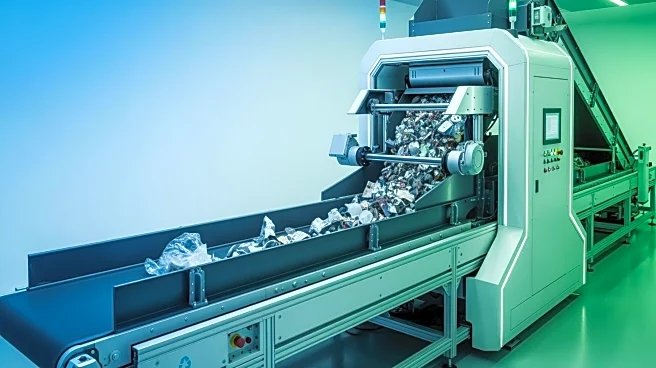What's Happening?
Manufacturers are increasingly integrating advanced technologies to improve waste management and sustainability practices. The focus is on smarter waste reporting, driven by the need for compliance with
regulations like Extended Producer Responsibility (EPR). This shift is transforming waste data from a compliance burden into a strategic asset. Key strategies include consolidating data through a single waste management partner for better visibility and compliance, and using AI-enabled systems to detect contamination in waste streams. These systems provide real-time insights, allowing manufacturers to address contamination at the source, thereby improving recycling quality and reducing risks. Additionally, manufacturers are beginning to treat waste as a measurable performance metric, similar to water or energy consumption, to enhance operational efficiency.
Why It's Important?
The adoption of smarter waste management practices is crucial for manufacturers facing increasing regulatory pressures and the need for sustainable operations. By leveraging data and AI, manufacturers can not only ensure compliance but also gain a competitive edge through improved operational efficiency and reduced environmental impact. This approach allows for better resource management, cost savings, and enhanced sustainability credentials, which are increasingly important to consumers and stakeholders. The shift towards data-driven waste management also supports broader environmental goals by reducing waste and emissions, contributing to a circular economy.
What's Next?
As AI and data analytics become more accessible, it is expected that more manufacturers, including smaller operators, will adopt these technologies. This could lead to industry-wide improvements in waste management practices and sustainability outcomes. Manufacturers may also explore further innovations in waste reduction and recycling technologies, driven by both regulatory requirements and market demand for sustainable products. The continued evolution of waste management strategies will likely involve greater collaboration between manufacturers, technology providers, and regulatory bodies to achieve shared sustainability goals.
Beyond the Headlines
The integration of AI in waste management highlights a broader trend of digital transformation in manufacturing. This shift not only addresses environmental concerns but also reflects a growing recognition of the value of data as a strategic asset. As manufacturers continue to innovate, there may be ethical considerations around data privacy and the impact of automation on the workforce. Additionally, the success of these initiatives will depend on the ability of manufacturers to effectively train and engage employees in new processes and technologies.









